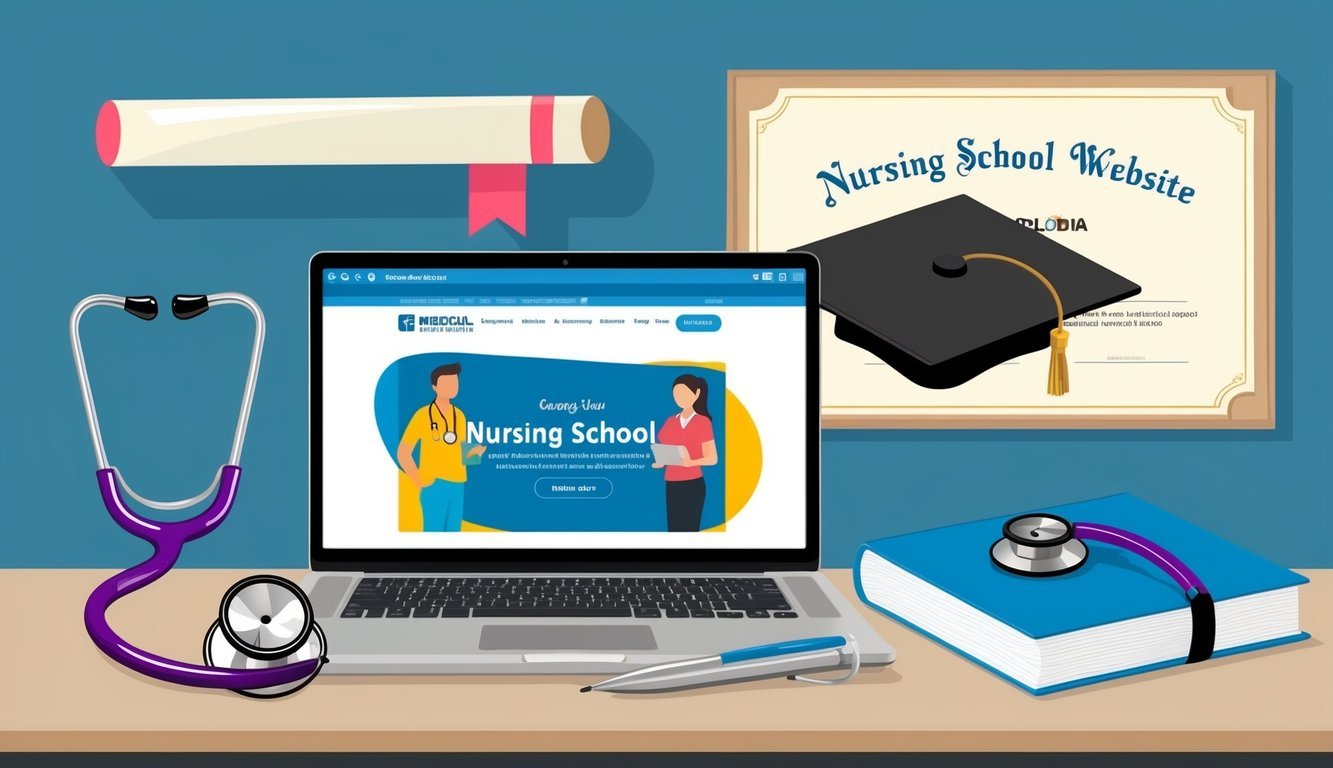Becoming a registered nurse (RN) is a rewarding and impactful career choice that allows you to make a difference in people’s lives every day.
To become an RN, you typically need to complete an accredited nursing program, earn either an Associate Degree in Nursing (ADN) or a Bachelor of Science in Nursing (BSN), and pass the NCLEX-RN examination.
With growing demand for healthcare professionals, this pathway not only offers job stability but also opportunities for specialization and advancement in your career.
As you explore how to enter this esteemed field, understanding the educational requirements and licensure processes is crucial.
While completing your nursing degree, hands-on clinical experiences will further prepare you for real-world patient care.
Additionally, you will learn essential skills that encompass both medical knowledge and compassionate patient interaction.
Resources like Nurse.org provide detailed insights on choosing the right program and navigating the path to licensure.
The journey to becoming an RN requires dedication and effort, but the rewards are significant.
You will not only join a respected profession but also contribute to the wellbeing of your community.
For further guidance on the steps involved, check out RegisteredNursing.org for more information.
Understanding the Role of a Registered Nurse
As a Registered Nurse (RN), you play a vital role in the healthcare system.
Your duties encompass a broad spectrum of responsibilities that influence patient outcomes.
The following subsections will detail the scope of your practice and the crucial aspects of nursing care.
Scope of Practice
The scope of practice for a Registered Nurse varies by state and specialty.
Generally, it includes assessment, diagnosis, planning, implementation, and evaluation of patient care.
RNs often collaborate with healthcare teams to develop individualized care plans.
Key responsibilities might include:
- Performing physical exams
- Administering medications
- Monitoring patient vital signs
- Educating patients about health management
It’s essential to understand the legal and regulatory framework governing your practice.
This knowledge ensures you remain compliant and provide safe care.
To explore specific guidelines, visit the American Nurses Association for more information.
Nursing Care and Patient Care
Your focus on patient care involves comprehensive interaction with individuals and families.
This includes managing emotional, physical, and educational needs.
RNs utilize their expertise to address diverse patient concerns, from chronic illnesses to acute conditions.
Consider the following elements of your role:
- Assessment: Gather critical health information and assess patient conditions.
- Care Coordination: Collaborate with interdisciplinary teams to ensure comprehensive care delivery.
- Patient Education: Provide essential information on disease prevention and management.
As a nurse, you advocate for your patients and ensure they receive high-quality, evidence-based care tailored to their specific needs.
Staying updated on best practices enhances your ability to contribute positively to patient outcomes.
For further insights on nursing specialties, refer to AAMCN.
Educational Pathways to Registered Nursing
To become a registered nurse (RN), you have several educational pathways.
The most common options include pursuing an Associate Degree in Nursing (ADN), earning a Bachelor of Science in Nursing (BSN), or enrolling in an Accelerated BSN program.
Each pathway has distinct characteristics and requirements.
Associate Degree in Nursing (ADN)
The ADN program typically takes about two to three years to complete.
This degree is often offered by community colleges and prepares you for entry-level nursing positions.
ADN programs include core nursing courses, clinical practice, and healthcare fundamentals.
Upon graduation, you must pass the NCLEX-RN exam to obtain your nursing license.
ADNs provide a quicker pathway to becoming an RN, making this route appealing for those looking to enter the workforce soon.
Bachelor of Science in Nursing (BSN)
A BSN usually requires four years of study at a university or college.
This program offers a more comprehensive education in nursing and healthcare management compared to an ADN.
BSN curricula cover subjects like nursing research, healthcare policy, and leadership.
These additional courses prepare you for diverse nursing roles and advancements in your career.
Graduates of BSN programs are also encouraged to take the NCLEX-RN exam for licensure.
This degree is increasingly preferred by employers, as it can lead to higher salary potential and career opportunities in specialized fields.
Accelerated BSN Programs
If you already hold a bachelor’s degree in another field, an Accelerated BSN program allows you to earn a BSN in a shorter timeframe—usually 11 to 18 months.
These intensive programs are designed for individuals seeking a career change and include a rigorous curriculum that covers essential nursing knowledge and clinical practice.
Like traditional BSN graduates, those from accelerated programs must pass the NCLEX-RN exam.
This route is popular among career changers due to its speed and the growing demand for BSN-educated nurses.
Choosing the right pathway depends on your current qualifications, career goals, and timeline for entering the nursing profession.
Attaining Licensure as a Registered Nurse
To become a registered nurse (RN), you must complete essential steps toward licensure.
This process typically includes passing the NCLEX-RN Examination and obtaining a state license through your state’s Board of Nursing.
The NCLEX-RN Examination
The NCLEX-RN Exam is a critical component for licensure.
This standardized test assesses your knowledge, skills, and abilities necessary for safe and effective nursing practice.
You must register for and successfully pass this examination to obtain your RN license.
Key areas covered in the exam include:
- Safe and Effective Care Environment
- Health Promotion and Maintenance
- Psychosocial Integrity
- Physiological Integrity
It is advisable to utilize resources such as practice exams and study guides to prepare effectively.
For more detailed information about the exam format and registration, visit the official NCLEX-RN website.
State Licensure and Board of Nursing
Once you pass the NCLEX-RN Exam, you must apply for licensure in your state.
Each state has specific requirements governed by its Board of Nursing.
The application typically includes:
- Proof of completed nursing education
- Background checks
- Payment of licensing fees
Licensure can be obtained for individual states or through the Enhanced Nurse Licensure Compact (eNLC), which allows for multistate practice.
Ensure you declare your primary state of residency as specified by the eNLC.
For further details, consult your state’s Board of Nursing website, where you can find guidance tailored to your location.
Advancing Your Nursing Career
As you progress in your nursing career, several pathways can enhance your qualifications and opportunities.
Focusing on further education and specialized certifications can position you for leadership roles, advanced practice positions, or educator roles.
RN to BSN Programs
Transitioning from an RN to a BSN can open doors to numerous opportunities.
These programs typically take 12 to 24 months to complete and can often be pursued online.
Key Benefits:
- Increased Earning Potential: BSN-educated nurses tend to earn higher salaries compared to those with an ADN.
- Career Advancement: Many healthcare institutions prefer or require a BSN for management and specialized roles.
- Skills Development: Enhance critical thinking, leadership, and clinical skills.
Consider exploring various RN to BSN options that fit your schedule and financial situation for maximum benefit.
Specialized Nursing Certifications
Pursuing specialized nursing certifications can significantly enhance your expertise and marketability.
Fields such as critical care, pediatrics, or geriatrics offer specialized certifications to demonstrate your skills.
Examples of Certifications:
- Certified Critical Care Nurse (CCRN)
- Certified Pediatric Nurse (CPN)
- Certified Nurse Educator (CNE)
These certifications often require additional coursework and clinical experience, but they boost your qualifications and expand your career options.
Many employers recognize these credentials as indicators of commitment and advanced knowledge.
Higher Education in Nursing
Furthering your education beyond the BSN can lead to advanced roles in nursing.
Options such as a Master of Science in Nursing (MSN) or a Doctor of Nursing Practice (DNP) can provide significant career advancements.
Advanced Roles Include:
- Advanced Practice Registered Nurse (APRN): This designation includes roles such as Nurse Practitioner (NP) and Clinical Nurse Specialist (CNS).
- Leadership Positions: Obtaining an MSN can qualify you for nurse administrator roles or leadership positions within healthcare organizations.
- Nurse Educators: With an MSN or doctoral degree, you can teach future nurses and contribute to academic settings.
Exploring these educational avenues can help you achieve your career aspirations in nursing.
Career Opportunities and Expectations

As a registered nurse (RN), you will encounter a variety of career paths, diverse healthcare settings, and specialized fields.
Understanding these opportunities will help you make informed decisions throughout your nursing career.
Diverse Healthcare Settings
Registered nurses work in numerous healthcare settings, including hospitals, clinics, schools, and long-term care facilities.
Each environment presents unique challenges and rewards.
- Hospitals: Most RNs begin their careers in hospitals, where they may work in critical care, medical-surgical units, or operating rooms.
- Ambulatory Care: In outpatient settings, RNs manage patient care and education for a range of conditions.
- Home Health: You may work with patients in their homes, providing care for those with chronic illnesses.
- Long-Term Care: Facilities such as nursing homes and rehabilitation centers require RNs to assist geriatric patients.
Specialties within Nursing
Specialization allows you to focus on specific patient populations or healthcare needs.
Some popular specialties include:
- Neonatal Nursing: Care for newborns, particularly those requiring intensive care.
- Geriatrics: Work with elderly populations managing complex health issues.
- Hospice: Provide end-of-life care, focusing on comfort and emotional support.
- Operating Room: Assist surgeons during procedures and manage surgical teams.
These specialties often require additional training or certification.
Exploring these options can lead to fulfilling careers tailored to your interests.
Salary Expectations and Job Outlook
The salary for registered nurses varies based on location, experience, and specialization.
According to the U.S. Bureau of Labor Statistics:
| Nursing Specialty | Average Annual Salary | Job Outlook (2022-2032) |
|---|---|---|
| Registered Nurse | $77,600 | +6% |
| Neonatal Nurse | $90,000 | +7% |
| Geriatric Nurse | $80,000 | +5% |
| Hospice Nurse | $78,000 | +8% |
As healthcare needs continue to grow, the demand for RNs remains strong.
RNs can also enhance their career trajectory and salary potential through specialization and advanced degrees.
For more details about salaries and job opportunities, you can visit Nurse.org.

